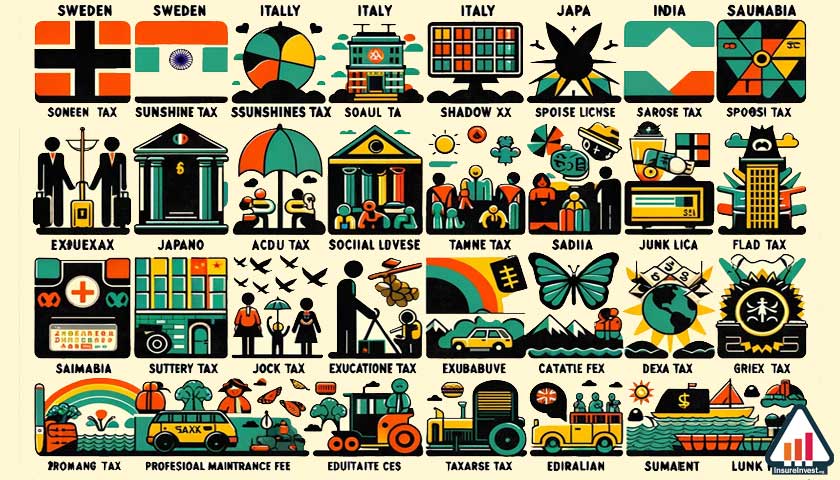Beyond Borders: Exploring Unique and Quirky Taxes Around the World
Taxation is an integral part of any country’s economic system, serving as the lifeblood that funds government operations and public services. However, not all taxes are created equal, and across the globe, there are some rather peculiar and fascinating taxes that distinguish one nation’s fiscal policies from another. In this exploration, we delve into the intriguing world of unique taxes that have found their way into the books of various countries.
Japan: “Widow Tax”
In Japan, widows and widowers can face higher income taxes compared to married couples. This has been a controversial tax, and there have been discussions about its reform.
Germany: “Solidarity Surcharge” (Solidaritätszuschlag)
Introduced in 1991 to help fund the costs of German reunification, this tax is an additional charge on income and corporate tax. As of my last knowledge update in 2022, there were plans to phase out the Solidarity Surcharge for most taxpayers.
Switzerland: “Wealth Tax”
Several Swiss cantons impose a wealth tax, which is calculated based on an individual’s or company’s net wealth. This tax is separate from income tax and is unique to the Swiss tax system.
India: “Cow Protection Tax”
In some Indian states, there have been proposals to introduce a tax to fund the protection and welfare of cows, considered sacred in Hinduism. The implementation of such taxes can vary among states.
United States: “Soda Tax”
Some U.S. cities and states have implemented taxes on sugary beverages to combat obesity and encourage healthier choices. Philadelphia was one of the first major cities to introduce a soda tax.
United Kingdom: “TV License Fee”
In the UK, households that watch or record live television broadcasts, including via the internet, are required to pay a TV License Fee. The revenue generated helps fund the BBC.
Norway: “Wealth Tax”
Norway imposes a wealth tax on individuals based on their net wealth. It is calculated as a percentage of the value of a person’s worldwide assets, including real estate, bank deposits, and securities.
France: “Solidarity Tax on Wealth” (Impôt de Solidarité sur la Fortune, ISF)
France used to have a wealth tax that applied to individuals with net assets above a certain threshold. However, as of my last update in 2022, it was replaced by a tax on real estate holdings (Impôt sur la Fortune Immobilière, IFI).
China: “Environmental Protection Tax”
China introduced an Environmental Protection Tax to encourage companies to reduce pollution. The tax is based on pollutants discharged into the air, water, and soil.
Sweden: “Carbon Tax”
Sweden has implemented a carbon tax to reduce greenhouse gas emissions. The tax is levied on fossil fuels and certain industrial processes that emit carbon dioxide.
Interesting Tax Types Around the World: A Global Overview
Taxes are a universal aspect of human civilization, but the way they are implemented can vary wildly from country to country. In this article, we’ll embark on a journey across the globe to explore some of the most unique and interesting tax types that various countries have devised.
Europe’s Creative Levies
Sweden’s “Sunshine Tax”: In Sweden, there’s a peculiar tax known as the “Sunshine Tax” which applies to owners of solar panels. This tax is levied on the electricity generated by these panels, showcasing an innovative approach to renewable energy taxation.
Italy’s “Shadow Tax”: Italy introduced a unique tax that could be straight out of a fairy tale. Known as the “Shadow Tax”, it is levied on businesses and individuals if their property or belongings cast shadows onto public spaces like sidewalks or squares.
United Kingdom’s “Television License”: While not strictly a tax, the UK’s television license fee functions similarly. Residents who watch live TV or use the BBC iPlayer service are required to pay this fee, which funds public broadcasting services.
Asia’s Unusual Taxes
China’s Social Maintenance Fee: In an effort to control population growth, China implemented the “Social Maintenance Fee”, commonly known as the one-child policy tax. This fee is imposed on families that have more than one child, although reforms in recent years have relaxed this policy.
Japan’s “Spouse Tax”: Japan introduced a controversial tax known as the “Spouse Tax”. Aimed at encouraging more women to enter the workforce, this tax penalizes married couples if one spouse earns significantly less than the other, thus discouraging dependency on a single income.
India’s “Education Cess”: India has a unique tax called the “Education Cess”. This is an additional tax levied on the total amount of income tax, specifically earmarked for funding education initiatives and improving the literacy rate in the country.
Americas’ Distinctive Tax Approaches
United States’ “Jock Tax”: The U.S. is known for its “Jock Tax,” a state-level income tax targeting professional athletes. This tax is based on the days they spend playing in different states, meaning athletes often file multiple state tax returns.
Canada’s “Butterfly Tax”: Canada has a unique “Butterfly Tax” applied to certain transactions involving the division of a corporation’s assets. Named after the “butterfly” reorganization, this tax ensures fair treatment of asset division for tax purposes.
Mexico’s “IEPS Tax on Junk Food”: Mexico introduced the IEPS tax, levied on junk food with high calorie and sugar content. This tax aims to curb obesity and encourage healthier eating habits among the population.
African and Middle Eastern Tax Quirks
Egypt’s “Professional Beggar Tax”: In an unusual move, Egypt once considered taxing professional beggars. This tax was aimed at those who beg as a profession, attempting to regulate this informal sector.
Zimbabwe’s “Cattle Tax”: Zimbabwe has implemented a tax on cattle owners. This tax is based on the number of cattle owned and is part of the government’s efforts to formalize the rural cattle rearing economy.
Saudi Arabia’s “Expatriate Tax”: Saudi Arabia imposes a tax on expatriates working in the kingdom. This tax varies based on the number of dependents the expatriate has, and is part of the country’s revenue diversification strategy.
Oceania’s Unique Tax Situations
Australia’s “Flood Levy”: Australia once implemented a temporary tax called the “Flood Levy” to fund reconstruction after severe flooding. This tax was applied to taxpayers earning above a certain threshold, showcasing a responsive approach to natural disasters.
New Zealand’s “Accident Compensation Corporation (ACC) Levies”: In New Zealand, the ACC levies are unique taxes charged to fund the country’s accident compensation scheme. These levies are applied to a range of activities, including vehicle registration and employer payrolls, ensuring comprehensive injury coverage for all residents.
Fiji’s “Environment and Climate Adaptation Levy”: Fiji introduced an “Environment and Climate Adaptation Levy,” aimed at funding environmental protection and climate change adaptation projects. This levy is applied to high-income earners and certain luxury goods, reflecting the country’s commitment to environmental sustainability.
Unusual Taxation in the Arctic and Antarctic Regions
Norway’s “Svalbard Tax”: On the Arctic archipelago of Svalbard, Norway imposes a significantly lower income tax rate compared to mainland Norway. This unique tax regime is part of the incentives to attract people to live and work in this remote and challenging environment.
No Taxation in Antarctica While not a tax, it’s interesting to note that there is no taxation system in Antarctica. This is due to the Antarctic Treaty, which sets the continent as a scientific preserve with no commercial or territorial claims.
From the sunniest beaches of Fiji to the icy expanses of Antarctica, our world is full of fascinating tax policies. Each of these taxes reflects the environmental, social, and economic contexts of their regions, illustrating the diverse ways that governments fund their operations and address societal challenges. Whether for raising revenue, regulating behavior, or funding specific initiatives, these taxes provide a unique glimpse into the priorities and creative solutions of nations around the globe.
In this global tour of unique taxes, we’ve witnessed how fiscal policies are shaped not only by economic considerations but also by cultural, environmental, and societal values. From the widow tax in Japan to the carbon tax in Sweden, each levy tells a story of a nation’s priorities and aspirations. As we navigate an ever-changing world, these unique taxes offer a glimpse into the diverse approaches countries take to address pressing issues. The fiscal landscape is evolving, and understanding the stories behind these taxes provides valuable insights into the complex interplay of economics and society on the global stage.





Hei! Norway’s Wealth Tax has been a part of our lives for a while. It’s interesting to see how it aligns with our values of equality. While debates about its effectiveness persist, there’s a sense of collective responsibility in contributing to the welfare of our society. Sammen står vi sterke!
Bonjour à tous! France’s shift from ISF to IFI is making waves in our discussions at the boulangerie. It’s a nuanced approach to wealth taxation, focusing on real estate. Ça fait réfléchir, you know? It reflects the constant effort to strike a balance between social equity and economic competitiveness.
Hej! Carbon tax in Sweden is something we’re proud of. It’s a small country, but we’re making big strides in environmental responsibility. Paying a bit extra for carbon emissions feels like a fair contribution to our beautiful nature. Håll i gång, Sweden!
Nǐ hǎo! Environmental Protection Tax in China is a step towards a greener future. It’s encouraging to see the government taking action on pollution. As someone who cares about the environment, I hope this tax sparks positive change and encourages businesses to be more eco-friendly.
Ciao a tutti! TV License Fee in the UK? Che strano! It’s a bit foreign to us, paying for a TV license. We’re used to our Rai tax to fund public broadcasting. I guess every country has its unique way of supporting media. Intriguing to see how these fees shape the media landscape.
Dia dhuit! We don’t have a specific soda tax, but it’s got me thinking about our love for a good cup of tea here. Maybe we need a tax on the sugar we stir into our tea cups! Jokes aside, it’s interesting how different countries approach health-related taxes. Sláinte to that!
Howdy! Soda taxes, huh? We love our sugary drinks here, so these taxes have stirred up a bit of controversy. It’s a bold move to tackle obesity through taxes, but some folks argue it’s an overreach. It’s like Uncle Sam is watching what we eat and drink. Wonder if it’ll really make a dent in our waistlines.
Namaste! The prospect of a Cow Protection Tax in some Indian states is generating quite the buzz. Cows have a special place in our culture, but turning that reverence into a tax is a unique approach. I’m curious to see how this unfolds and whether it will truly contribute to the well-being of these sacred animals.
Guten Tag! The Solidarity Surcharge has been a point of discussion at our Stammtisch. We’ve been anticipating its phase-out for quite some time. It’s interesting to see how a tax introduced for a specific purpose can persist over the years. The changes ahead will certainly have an impact on how we view fiscal policies in our country.
Ohayo gozaimasu! The Widow Tax here in Japan is a topic that often comes up during family gatherings. It’s quite a unique twist on our tax system. While I understand the intent, the debate around its societal impact is fascinating. It feels like we’re in a time where traditional norms and tax policies are clashing. Ganbatte to all the widows and widowers out there facing the Widow Tax with strength and resilience!